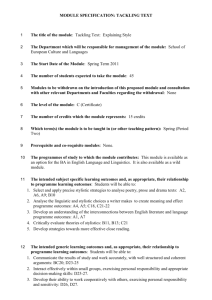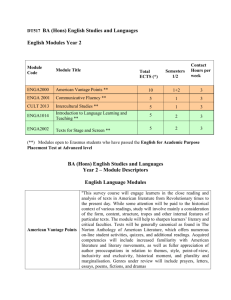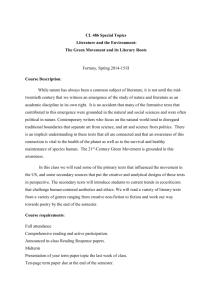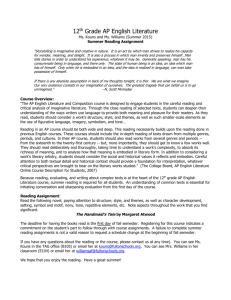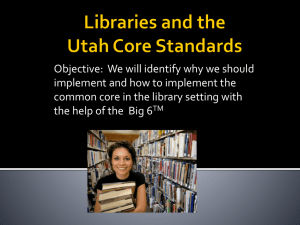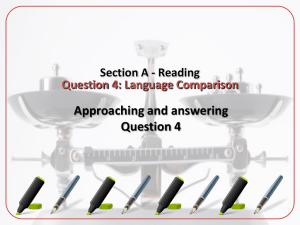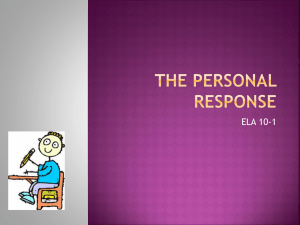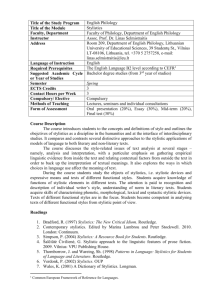University of Kent at Canterbury
advertisement
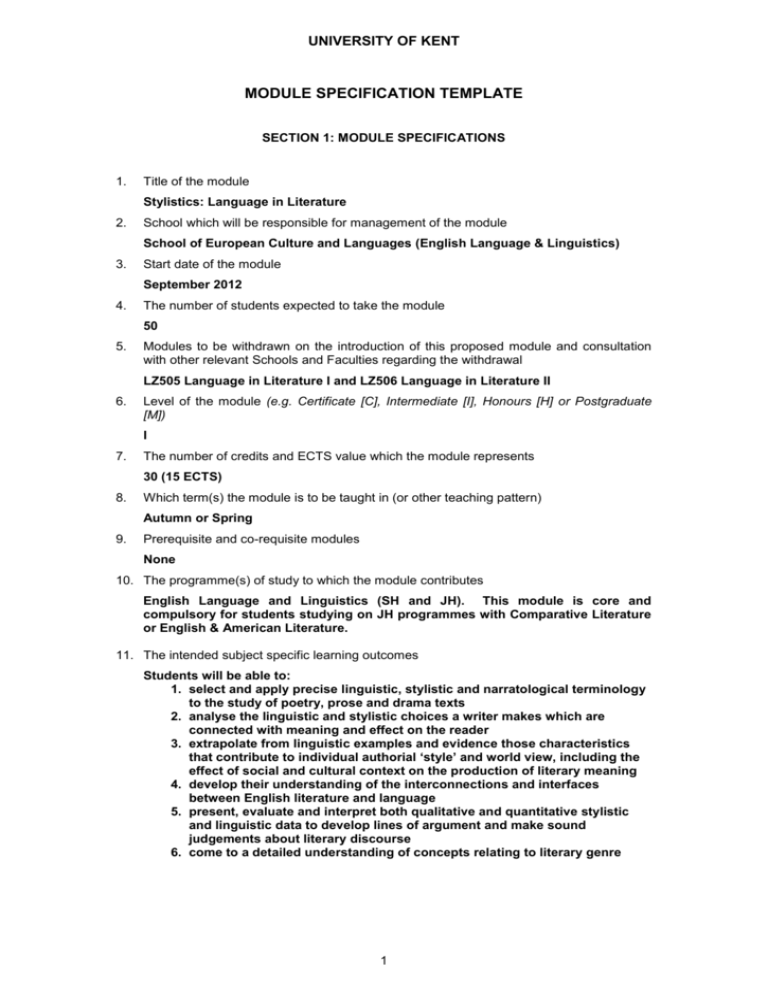
UNIVERSITY OF KENT MODULE SPECIFICATION TEMPLATE SECTION 1: MODULE SPECIFICATIONS 1. Title of the module Stylistics: Language in Literature 2. School which will be responsible for management of the module School of European Culture and Languages (English Language & Linguistics) 3. Start date of the module September 2012 4. The number of students expected to take the module 50 5. Modules to be withdrawn on the introduction of this proposed module and consultation with other relevant Schools and Faculties regarding the withdrawal LZ505 Language in Literature I and LZ506 Language in Literature II 6. Level of the module (e.g. Certificate [C], Intermediate [I], Honours [H] or Postgraduate [M]) I 7. The number of credits and ECTS value which the module represents 30 (15 ECTS) 8. Which term(s) the module is to be taught in (or other teaching pattern) Autumn or Spring 9. Prerequisite and co-requisite modules None 10. The programme(s) of study to which the module contributes English Language and Linguistics (SH and JH). This module is core and compulsory for students studying on JH programmes with Comparative Literature or English & American Literature. 11. The intended subject specific learning outcomes Students will be able to: 1. select and apply precise linguistic, stylistic and narratological terminology to the study of poetry, prose and drama texts 2. analyse the linguistic and stylistic choices a writer makes which are connected with meaning and effect on the reader 3. extrapolate from linguistic examples and evidence those characteristics that contribute to individual authorial ‘style’ and world view, including the effect of social and cultural context on the production of literary meaning 4. develop their understanding of the interconnections and interfaces between English literature and language 5. present, evaluate and interpret both qualitative and quantitative stylistic and linguistic data to develop lines of argument and make sound judgements about literary discourse 6. come to a detailed understanding of concepts relating to literary genre 1 UNIVERSITY OF KENT 12. The intended generic learning outcomes and, as appropriate, their relationship to programme learning outcomes Students will be able to: 1. engage in critical reflection, verbal discussion and written analysis of various core theoretical texts, exemplar texts and secondary critical commentary and to devise and sustain arguments relating to this analysis using ideas and techniques at the forefront of the discipline; students will also gain an appreciation of the uncertainty and ambiguity of language and meaning through engagement with this body of critical and stylistic theory 2. make judgments about the appropriateness of different theoretical approaches to problem-solving in texts, frame appropriate questions to achieve a solution – or identify a range of solutions - and evaluate the efficacy of such approaches 3. demonstrate the ability to undertake independent learning (exercising initiative and personal responsibility), use secondary texts with critical discrimination, reflect critically on their own academic work and present cogent arguments in both oral and written form 13. A synopsis of the curriculum This module is concerned with the stylistic analysis of literature and is based on the premise that the decision to study literature is also a decision to study the expressive mechanics of language (and vice versa). Attention is given to all three main genres (poetry, prose fiction and drama); thus the module is divided into three blocks according to the kind of text analysed. The first section examines poetry and considers topics such as patterns of lexis, phonetic and metrical organisation and the relationship to meaning; the second looks at fiction through patterns of style variation, inferencing and speech thought presentation; the third examines drama and considers topics such as the patterns in turn-taking and their relationship to the roles and functions of characters, speech act analysis and styles of politeness behaviour. At all stages of the module, the social and cultural context of the works studies will be an important consideration. 14. Indicative Reading List Culpepper, J, M. Short and P. Verdonk (1988) Exploring the Language of Drama: from Text to Context, Routledge. Short, M.H. (1986) Exploring the Language of Poems, Plays and Prose, Longman. Verdonk, P. and J.J. Weber (1996) Twentieth Century Fiction: from Text to Context, Routledge. Simpson, P. (2004) Stylistics: a resource book for students, Routledge. Short, M. and G. Leech (2007) Style in Fiction: a linguistic introduction to English fictional prose, Longman. 15. Learning and Teaching Methods, including the nature and number of contact hours and the total study hours which will be expected of students, and how these relate to achievement of the intended learning outcomes One one-hour lecture per week + one two-hour seminar per week x 10 = 30 total contact hours (Total study hours = 300) + film screenings, reading events, compulsory assessment feedback sessions and open lectures. During lectures, methodological tools and model analyses will be presented and discussed, helping students to achieve the following learning outcomes: to demonstrate good knowledge of twentieth-century and more recent literary and linguistic theory, to come to an awareness of current thinking in the discipline of stylistics and literary studies more generally, to situate these theories in a wider cultural context and to understand the value and the limitations/drawbacks of such 2 UNIVERSITY OF KENT approaches to the literary text. Lectures will also give practise in extracting information from oral sources and reflecting critically on this information, helping the acquisition of key skills. (LO: 11.4-6 & 12.1-2) The seminars will allow students to re-interrogate the methods and techniques they have learned in lectures and on prerequisite modules to review, consolidate, extend and apply their knowledge and understanding, and to initiate and follow through their own projects (students are encouraged to demonstrate self-direction and originality). There will also be ample opportunity for critical reflection on the part of the individual student, helping to fulfil the following learning outcomes: to carry out detailed analysis of a range of texts, use linguistic, stylistic and literary theory and related concepts to make informed critical and evaluative judgments, demonstrate a detailed understanding of the interconnections between language and literature and come to a detailed understanding of the nature of literary genre. (LO: 11.1-6 & 12.1-3) Seminars will also contribute to the achievement of the following generic outcomes: to engage in critical reflection, verbal discussion and written analysis of various texts, to make judgments about the appropriateness of different theoretical approaches to problem-solving in texts and to demonstrate the ability to undertake independent learning and to self-direct, use secondary texts with critical discrimination, reflect critically on their own academic work and present cogent arguments in oral form through seminar presentations and associated group work. (LO: 11.6 & 12.1-3) 16. Assessment methods and how these relate to testing achievement of the intended learning outcomes 100% coursework, made up of 1 1000-word essay (30%), 1 2000-word essay (60%) and seminar contribution (10%). The essays will test achievement of the following learning outcomes: a systematic and detailed understanding of stylistic, linguistic and literary theory, contextualising these theories, carrying out detailed textual analysis, showing cogent application of particular theories and approaches, making critical and evaluative judgements about texts, demonstrating detailed understanding of the interconnections between style and genre and understanding how theoretical approaches to the text impact on a wide range of themes and topics. (LO 11.1-5) Essays will also help test the achievement of the following generic outcomes and key skills: critical reflection, written analysis, the ability to undertake independent learning and use secondary texts with critical discrimination, present cogent arguments in written form, communicate logically and effectively in writing and use IT appropriately and effectively. (LO 11.6 & 12.1-3) The seminar contribution mark will test achievement and understanding of all of the above (with the exception of writing skills). 17. Implications for learning resources, including staff, library, IT and space Staffing will be provided from the existing resources of the English Language and Linguistics Section of SECL. The library already has extensive holdings in the area covered by the course, including multiple copies of all key texts. No special implications for new IT or space resources are anticipated. 18. The School recognises and has embedded the expectations of current disability equality legislation, and supports students with a declared disability or special educational need in its teaching. Within this module we will make reasonable adjustments wherever necessary, including additional or substitute materials, teaching modes or assessment 3 UNIVERSITY OF KENT methods for students who have declared and discussed their learning support needs. Arrangements for students with declared disabilities will be made on an individual basis, in consultation with the University’s disability/dyslexia support service, and specialist support will be provided where needed. 19. Campus(es) where module will be delivered Canterbury If the module is part of a programme in a Partner College or Validated Institution, please complete the following: 20. Partner College/Validated Institution: 21. University School (for cognate programmes) or Faculty (for non-cognate programmes) responsible for the programme: SECTION 2: MODULE IS PART OF A PROGRAMME OF STUDY IN A UNIVERSITY SCHOOL Statement by the School Director of Learning and Teaching/School Director of Graduate Studies (as appropriate): "I confirm I have been consulted on the above module proposal and have given advice on the correct procedures and required content of module proposals" ................................................................ .............................................. Director of Learning and Teaching/Director of Graduate Studies (delete as applicable) Date ………………………………………………… Print Name Statement by the Head of School: "I confirm that the School has approved the introduction of the module and, where the module is proposed by School staff, will be responsible for its resourcing" ................................................................. .............................................. Head of School Date ……………………………………………………. Print Name 4
